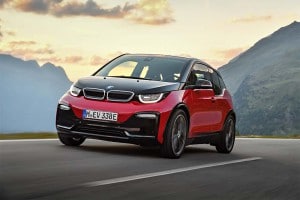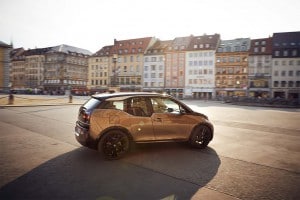BMW is abandoning the range-extending version of its i3 city car, the automaker has confirmed, a senior executive saying the concept “has no future” as the Bavarian automaker prepares to expand its all-electric line-up.
First introduced in 2014, the REx version of the i3 was meant to help buyers overcome dreaded range anxiety by allowing them to continue operating on gasoline were the battery to run down. Technically known as a series hybrid, the i3 REx relied on a two-cylinder gas engine whose only purpose was to provide energy to drive the little car’s electric motors. The internal combustion engine was never used to provide torque directly to the i3’s wheels.
There will now be just two versions of the i3 available, including the base battery-car and the sportier i3s. But the decision to drop the REx comes as BMW prepares to start selling an all-new battery-electric vehicle, the i4, its first midsize BEV.
BMW was one of the first automakers to commit to electrification with a unique sub-brand, BMW i. Several competitors have now copied that move, including Mercedes, with its EQ line-up, and Volkswagen, with its all-electric ID models.
(BMW brings three new models to LA Auto Show for global debut.)

The i3s got a 14 hp and 15 lb-ft bump over the standard BMW i3 model, with the city car also getting a bigger battery and more range.
For its part, the Bavarian maker has been making a number of strategic changes in its approach to electrification. Its original plan positioned the i brand as its outlet for battery-powered vehicles. And those models were to rely on unique, skateboard-like platforms.
The sub-brand will still have some models using those unique “architectures,” but BMW has now decided to offer various forms of electric drive for virtually all of its products, including more familiar models like the 3-Series and X5. It currently is developing more flexible platforms that can handle pretty much any sort of powertrain alternative, from pure gas – or diesel – all the way up to all-electric.
Meanwhile, as battery technology continues to improve — lithium-ion cells getting smaller, more energy dense and less expensive – BMW has come to the conclusion that it no longer wants to sell BEWV products with limited range, as was the case with the original i3. When it first came to market it offered just 80 miles per charge. That was enough to handle most daily commutes and chores, but buyers made it clear they wanted a bit more security, especially considering how rare public chargers were when the i3 first came to market.
Today, there are over 10,000 public chargers in the U.S. – even without factoring in Tesla’s proprietary Supercharger network – with that figure expected to more than double by mid-decade. And a growing number of those are quick chargers which slash the time a vehicle needs to be plugged in.
Meanwhile, the latest version of the BMW i3 now is capable of delivering 150 miles per charge, nearly double the range of the original model – and roughly what the REx could deliver combining electric and gas power.
With that in mind, the range-extender “has no future,” Jan Freimann, BMW’s e-mobility chief told Green Car Reports during last week’s Los Angeles Auto Show.
BMW expanded upon that in a statement, noting that “With the gains in pure-electric range, together with the increasing availability of rapid charging facilities we believe the customer demand is shifting to a pure-electric model.”
BMW isn’t the only one pulling the plug on range-extender technology. General Motors has come to the same conclusion concerning its Chevrolet Volt model. In GM’s case, however, the automaker is all but entirely abandoning all forms of electrification but for pure battery-electric vehicles, such as the Chevy Bolt EV and nearly 20 other BEVs it promises to have in production by 2023.
(Despite slow start, GM’s EV chief says its all-electric program is “on track.”)
For its part, however, BMW still plans to offer more conventional plug-in hybrids, such as the i8 sports car – at least for now. These parallel hybrids use gas motors not only to keep a vehicle going when its battery is drained but also to add more power directly to the driveline.
Whether the Bavarian marque adopts an even more radical, all-electric approach, in line with the strategy at GM and Volkswagen, will likely depend upon market response. For now, BMW intends to retain the flexibility to deliver pretty much any form of drivetrain technology customers demand.
(All BMW models to be electric by 2030.)


